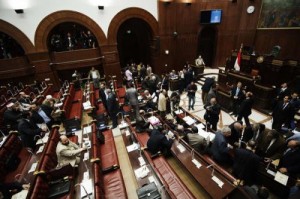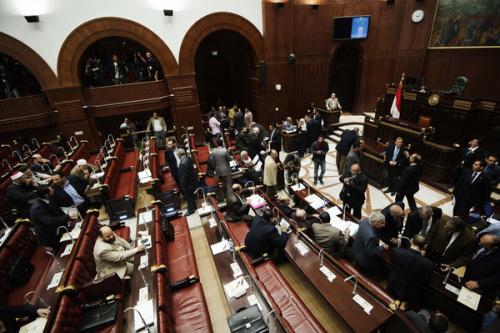
(AFP Photo)
The Supreme Constitutional Court (SCC) rejected on Sunday a case to dissolve the Constituent Assembly.
The case, filed in August, called for the dissolution of the assembly on grounds that President Mohamed Morsi signed the bill forming it into law a month after the parliament that drafted it was dissolved, which renders the law invalid.
The Constituent Assembly also included among its membership several members of parliament, which was one of the reasons the court had dissolved a previous assembly in April.
The court rejected the new case, however, since the assembly no longer exists. The Constituent Assembly was automatically dissolved after it completed drafting the new constitution which was subjected to a nationwide referendum.
The SCC said it would rule on the Shura Council dissolution case next week after it receives an advisory report from its commissioner’s authority. It had earlier sent the case to the authority since the upper house of parliament’s status changed under the new constitution.
Several lawyers filed complaints calling for the dissolution of the council, arguing that the law its elections were based upon was unconstitutional. In June the court had dissolved the People’s Assembly, the lower house of parliament. It ruled the elections law, used for both house elections, unconstitutional.
The court was meant to rule on these cases on 2 December but Islamist supporters of Morsy surrounded the building and prevented judges from entering, forcing the court to suspend activity.
By the time the court reconvened the new constitution had passed.
Now the court has three options as to how to determine the legality of the council; rule on the elections law as per the constitutional decree in effect at the time of the council elections, Morsy’s November constitutional decree, or the newly drafted constitution.
The new constitution transferred full legislative authority to the Shura Council until a new lower house, renamed the House of Representatives, is elected. The constitution also bestows new legislative powers on the council in general, in addition to the ones it held during the transitional period.




